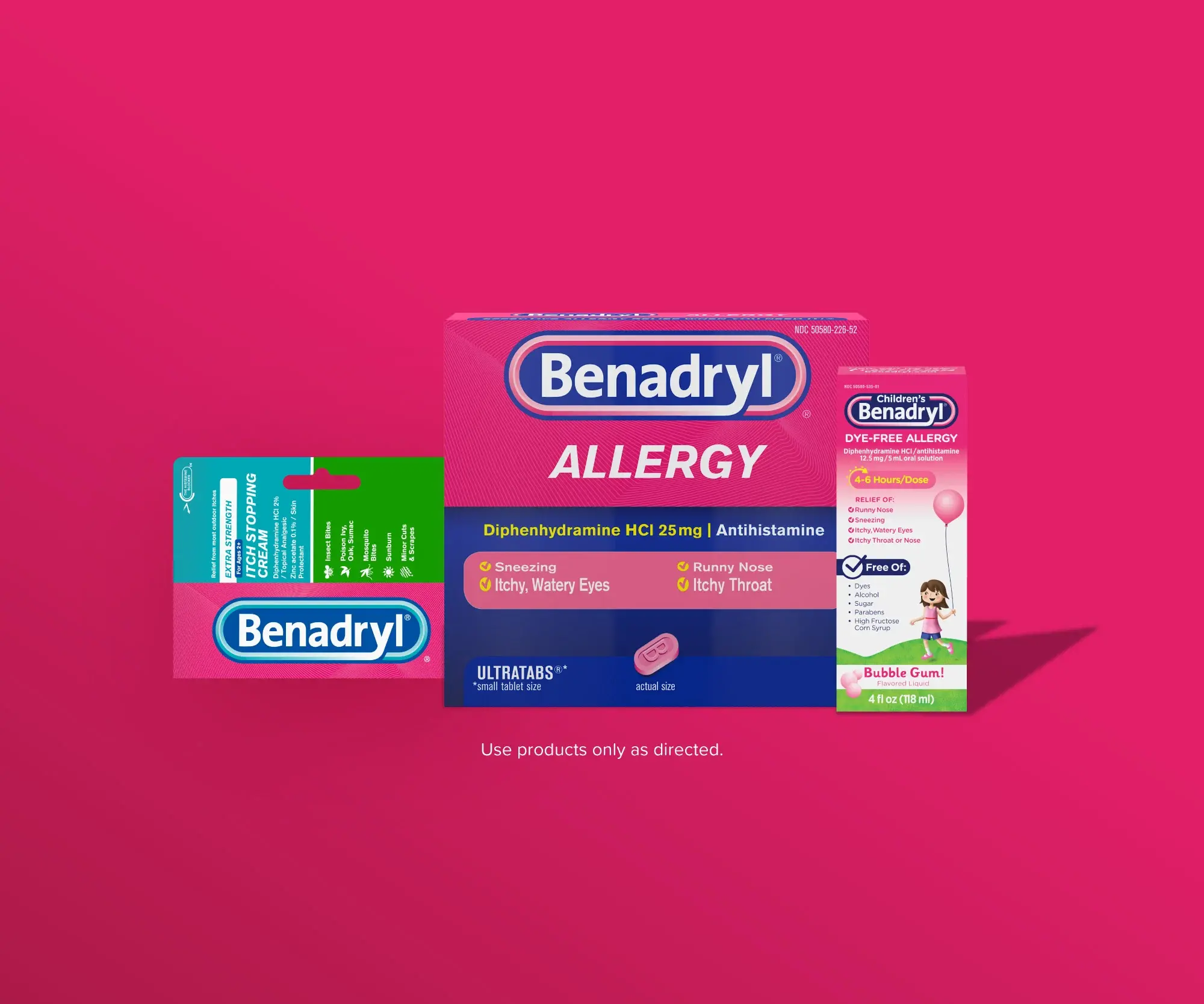What Is Diphenhydramine HCl and What Does It Do?
The active ingredient in BENADRYL® is an antihistamine called diphenhydramine hydrochloride or diphenhydramine HCl. Antihistamines are used for relief from symptoms related to hay fever, upper respiratory allergy, or cold symptoms.
Antihistamines are a class of drugs that block histamine from binding to H1 receptors in the body. Histamines are molecules in the body’s cells that are responsible for many allergy symptoms, such as runny nose, sneezing, and itchy eyes.
What Is Diphenhydramine HCl Used For?
Diphenhydramine can be taken as oral allergy medicine, oral cold medicine, or topical antihistamine.
BENADRYL® or Diphenhydramine taken orally provides temporary relief from allergy and cold symptoms such as:
Sneezing
Runny nose
Itchy, watery eyes
Diphenhydramine is often combined with another active ingredient, zinc acetate. The combination applied to the skin topically helps protect skin and temporarily relieves itching associated with:
Insect and bug bites
Sunburn
Scrapes
Minor skin irritations and burns
Rashes caused by poison ivy, poison oak, and sumac
Find more information about uses and indications for BENADRYL® oral and topical products here.
What Forms Does Diphenhydramine HCl Come In?
Diphenhydramine in medicines can come in two main forms — oral and topical.
Oral diphenhydramine is available in different dosage forms including tablets, liquid gels, liquid medicine, and chewable tablets. Dosage forms are available for adults and children.
Topical diphenhydramine is available in cream, spray, stick, and gel to help relieve itchy skin.
Oral Allergy & Cold Symptom Relief Medicine
For temporary relief of allergy symptoms in adults and children 6 years and older, consider BENADRYL® Allergy ULTRATABS® Tablets or BENADRYL® Allergy Dye-Free LIQUI-GELS® with diphenhydramine 25 mg.
For children, BENADRYL® products can provide effective relief from hay fever and allergy symptoms. For children ages 6 to 11 years, consider Children’s BENADRYL® Allergy Liquid and Children’s BENADRYL® Dye-Free Allergy Liquid Antihistamine Medicine with diphenhydramine 12.5 mg per 5 mL.
For allergy and cold symptom relief for adults and children 12 years and older, consider BENADRYL® Allergy Plus Congestion for Sinus Pressure & Nasal Congestion Relief. For adults and children 6 years and older, consider Children’s BENADRYL® Allergy Plus Congestion Nasal Decongestant & Sinus Medicine for Kids.
Topical Itchy Skin Relief
BENADRYL® topical products can provide temporary relief from pain and itching associated with insect bites, rashes, and minor skin irritations. To help protect skin and temporarily relieve itching, consider BENADRYL® Itch Stopping Cream or BENADRYL® Extra Strength Itch Stopping Cream. Consider BENADRYL® Extra Strength Spray to quickly apply to your rash or insect bite as soon as itching starts.
For easy-to-apply immediate relief in stick form, consider BENADRYL® Extra Strength Itch Relief Stick for Rashes, Insect and Bug Bites. Or consider the soothing relief of gel with BENADRYL® Itch Stopping Gel Extra Strength Topical Analgesic Gel for Itchy Skin.
BENADRYL® Diphenhydramine HCl Side-Effects, Safety, and Dosage
Just like with any medication you might take, sometimes BENADRYL® (diphenhydramine) can cause side effects if misused. To avoid misuse and diphenhydramine HCl side effects, see the following warnings:
Do not use:
To make a child sleepy
With any other product containing diphenhydramine, even one used on skin
Ask a doctor before use if you have:
A breathing problem such as emphysema or chronic bronchitis
Glaucoma
Trouble urinating due to an enlarged prostate gland
Ask a doctor or pharmacist before use if you are taking sedatives or tranquilizers.
Diphenhydramine side effects and things to remember when using this product:
Marked drowsiness may occur
Avoid alcoholic drinks
Alcohol, sedatives, and tranquilizers may increase drowsiness
Be careful when driving a motor vehicle or operating machinery
Excitability may occur, especially in children
If pregnant or breast-feeding, ask a health professional before use.
Keep out of reach of children. In case of overdose, get medical help or contact a Poison Control Center right away. (1-800-222-1222)
You should also speak to your doctor before taking diphenhydramine if you’re allergic to any medications or taking another prescribed medication.
When taking diphenhydramine, alcohol, sedatives, and tranquilizers may increase drowsiness, so these should be avoided. Be careful when driving a motor vehicle or operating machinery.
The appropriate dosage of diphenhydramine depends on your age and symptoms. Find the right BENADRYL® product to give you or your child relief, and carefully read and follow the entire product label before giving the medication to ensure you are administering the proper diphenhydramine dosage.
The safety of the people who use our products is our top priority. To learn more about steps taken to address misuse and abuse of BENADRYL® and other diphenhydramine-containing products, visit our SAFETY page.
Additional Resources
Find additional information about BENADRYL®’s inactive ingredients here.
Compare BENADRYL® (Diphenhydramine HCl) and other allergy relief products here.
Visit our Frequently Asked Questions page for additional answers to your questions about BENADRYL®.
References
Cleveland Clinic. Diphenhydramine Capsules or Tablets. Accessed from: https://my.clevelandclinic.org/health/drugs/19101-diphenhydramine-capsules-or-tablets
Cleveland Clinic. Hydrocortisone Skin Cream, Ointment, Lotion, or Solution. Accessed from: https://my.clevelandclinic.org/health/drugs/18748-hydrocortisone-skin-cream-ointment-lotion-or-solution


